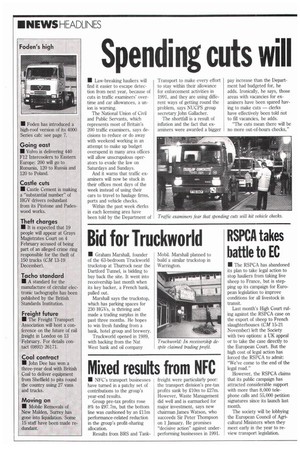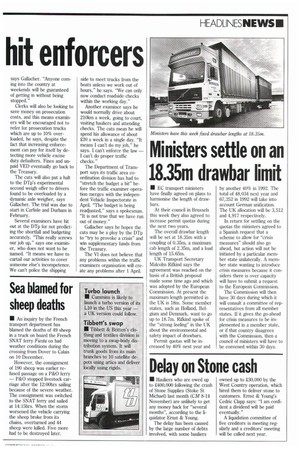Spending cuts will hit enforcers
Page 6

Page 7

If you've noticed an error in this article please click here to report it so we can fix it.
• Law-breaking hauliers will find it easier to escape detection from next year, because of cuts in traffic examiners overtime and car allowances, a union is warning.
The National Union of Civil and Public Servants, which represents most of Britain's 200 traffic examiners, says decisions to reduce or do away with weekend working in an attempt to make up budget overspend in many area offices will allow unscrupulous operators to evade the law on Saturdays and Sundays.
And it warns that traffic examiners will now be stuck in their offices most days of the week instead of using their cars to travel to haulage firms, ports and vehicle checks.
Within the past week derks in each licensing area have been told by the Department of Transport to make every effort to stay within their allowance for enforcement activities in 1991, and they are using different ways of getting round the problem, says NUCPS group secretary John Gallacher.
The shortfall is a result of inflation and the fact that examiners were awarded a bigger pay increase than the Department had budgeted for, he adds. Ironically, he says, those areas with vacancies for examiners have been spared having to make cuts — clerks_ have effectively been told not to fill vacancies, he adds.
"The cuts mean there will be no more out-of-hours checks," says Gallacher. "Anyone coming into the country at weekends will be guaranteed of getting in without being stopped."
Clerks will also be looking to save money on prosecution costs, and this means examiners will be encouraged not to refer for prosecution trucks which are up to 10% overloaded, he says, despite the fact that increasing enforcement can pay for itself by detecting more vehicle excise duty defaulters. Fines and unpaid VED eventually go back to the Treasury.
The cuts will also put a halt to the DTp's experimental second weigh offer to drivers found to be overloaded by a dynamic axle weigher, says Gallacher. The trial was due to start in Carlisle and Durham in February.
Several examiners have hit out at the DTp for not predicting the shortfall and budgeting accurately. "This really screws our job up," says one examiner, who does not want to be named. "It means we have to curtail our activities to cover someone else's incompetence. We can't police the shipping side to meet trucks from the boats unless we work out of hours," he says_ "We can only now conduct roadside checks within the working day."
Another examiner says he would normally drive about 210km a week, going to court, visiting hauliers and attending checks. The cuts mean he will spend his allowance of about £20 a week in a single day. "It means I can't do my job," he says. I can't enforce the law — I can't do proper traffic checks."
The Department of Transport says its traffic area coordination division has had to "stretch the budget a bit" before the traffic examiner operation merges with the independent Vehicle Inspectorate in April. "The budget is being readjusted," says a spokesman. "It is not true that we have run out of money."
Gallacher says he hopes the cuts may be a ploy by the DTp to "try to provoke a crisis" and win supplementary funds from the Treasury.
The VI does not believe that any problems within the traffic examiners organisation will create any problems after 1 April.
























































